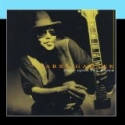
Definitely one of the best of the contemporary bluesmen – an artist who can draw new recruits to the blues in a way other exponents of the genre might not. Garner has a natural talent for storytelling and a singular approach to music making; he isn’t really content to try and find a personal interpretation of traditional or prevailing influences or existing blues styles.
I once saw an advert for an upcoming concert in the UK which said Garner was “blues you could dance to” and I wouldn’t argue with that. He was raised in the Baton Rouge area and early on played in gospel and straight ahead R&B bands. His first inspiration was the guitar-playing preacher Reverend Utah Smith but he was also inspired by local swamp bluesmen Silas Hogan and Clarence Edwards. He actually learned how to play guitar from his uncle and a couple of gospel-playing elders. As he puts it “I started playing guitar because I had an uncle, George, who taught me. He was a paraplegic, and he played like Jimmy Reed. I learned through him, and started playing at the church and behind a gospel group that played on the radio. My parents didn’t want me playing the blues. They thought it was the devil’s music — then I guess the juke joint a quarter-mile down the road was the devil’s recruitment office. I never went into the juke except during the day, when it was a store.”

After serving in the army he actually quit music altogether for around ten years. He worked in a a Dow chemical plant for almost two decades until his retirement. Presumably he did that because he couldn’t make full time musician pay as a profession. Hard to believe that a guy with this much talent had to hold down a day job for so long. Around 1983, he started to sit in on local shows again and within two years had formed his own band, quickly gaining a reputation for his live performances and for the fact that much of the material played was self-penned.
All his albums are worth getting hold of, starting off with his first album proper “Double Dues” (he had previously issued a cassette of his own material, which got him a label deal). He released “Too Blues” in 1993, by which time he had already become a favourite in the UK and Europe. Recording for a bigger label (Verve) has not really changed his approach to his music but has allowed a bit more care in the production. Take a listen to “You Need To Live A Little” and, especially, “Standing Room Only” and “Once Upon The Blues” from 2000, all of which have received excellent reviews. As I have to choose one as a starter on this primer, I’ll go for “Once Upon The Blues” – great playing, excellent songs and a lovely mix of styles. In 2008 he released “Here Today, Gone Tomorrow“, partly inspired by his recovery from a serious illness. The 2012 release “Blues for Sale” is up to his usual standard.
Many are turned off the blues because both veterans and younger artists alike rely too heavily on overdone standards and cover material. If I could only hear blues performances that kick off with the immortal ‘Woke Up This Morning’, I think I might turn my back on the genre. Fortunately, there is an alternative. Larry produces clever, challenging, thoroughly contemporary songs in a variety of styles. Possibly the best songwriter in blues today. Blues sensibilities, witty writing with a contemporary take on life – it all adds up to great music!
